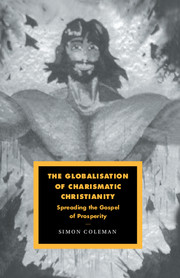Book contents
- Frontmatter
- Contents
- List of illustrations
- Acknowledgements
- Introduction
- Chapter One A ‘weird babel of tongues’: charisma in the modern world
- Chapter Two ‘Faith which conquers the world’: globalisation and charisma
- Chapter Three Sweden: national ‘state’ and global ‘site’
- Chapter Four The Word of Life: organising global culture
- Chapter Five Words: from narrative to embodiment
- Chapter Six Aesthetics: from iconography to architecture
- Chapter Seven Broadcasting the faith
- Chapter Eight Expansive agency
- Chapter Nine Contesting the nation
- Chapter Ten The Word and the world
- References
- Index
Chapter Eight - Expansive agency
Published online by Cambridge University Press: 22 September 2009
- Frontmatter
- Contents
- List of illustrations
- Acknowledgements
- Introduction
- Chapter One A ‘weird babel of tongues’: charisma in the modern world
- Chapter Two ‘Faith which conquers the world’: globalisation and charisma
- Chapter Three Sweden: national ‘state’ and global ‘site’
- Chapter Four The Word of Life: organising global culture
- Chapter Five Words: from narrative to embodiment
- Chapter Six Aesthetics: from iconography to architecture
- Chapter Seven Broadcasting the faith
- Chapter Eight Expansive agency
- Chapter Nine Contesting the nation
- Chapter Ten The Word and the world
- References
- Index
Summary
If a single image defines the Word of Life to sceptical outsiders, it is that of the accumulation of money. A television documentary, broadcast nationally in 1985 and repeated the next year, focussed on the ministry's practice of taking collections in large white buckets. It closed with the words: ‘From nought to twenty million kronor in two years, and turnover growing all the time – when Ulf Ekman preaches the Word of Life.’ Critical books by Swedish clergymen, with titles such as God and Money: On Prosperity Theology in the USA and Sweden (Hellberg 1987) or Para-churches: On Business and Prayer in Sweden (Nilsson 1988), highlight similar concerns in their promotion of the view that spiritual authenticity is inevitably compromised by material rewards.
Money does have an all-pervading and multivalent significance in the lives of many Word of Life adherents. Of course, it could simply be argued that considerable finance is needed to maintain ambitious and technologically driven programmes of expansion (Barron 1987). Such a view, while partially justified, cannot provide a complete understanding of the extent to which imagery related to wealth, finance and business is constitutive of identity: it promotes a limited, ‘top-down’ perspective on Prosperity beliefs, according to which ordinary members are viewed as mere suppliers of material resources for a growing religious organisation. A more subtle approach might argue that Faith Christians are invoking but also transforming an older Protestant Ethic, in line with wider societal trends.
- Type
- Chapter
- Information
- The Globalisation of Charismatic Christianity , pp. 187 - 207Publisher: Cambridge University PressPrint publication year: 2000

